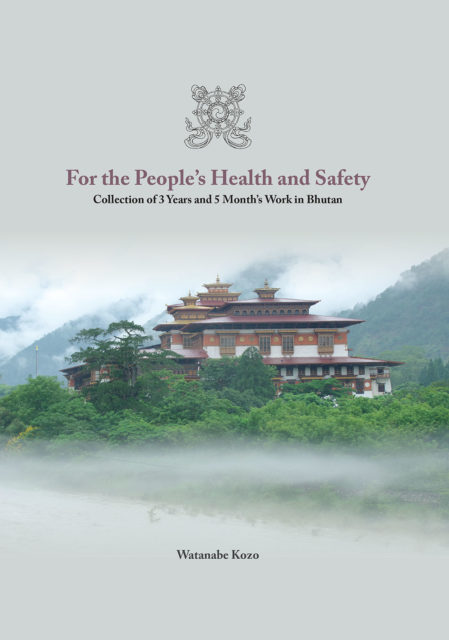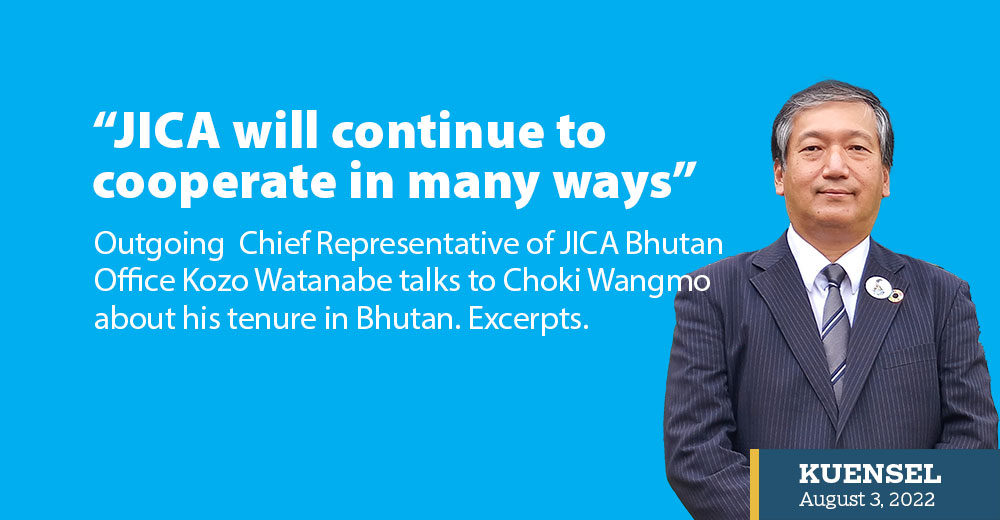Outgoing Chief Representative of JICA Bhutan Office Kozo Watanabe talks to Choki Wangmo about his tenure in Bhutan. Excerpts.
In your more than three years’ tenure as a JICA Bhutan CR, what is one of the achievements you’re proud of?
In the Covid-19 response period, initiated a technical cooperation project with KGUMSB ‘the Project for Strengthen the Quality of Education’. At a time when everyone wants to be useful in the Covid-19 measures, all staff of JICA Bhutan Office worked together to carry out a variety of activities that benefited Bhutanese society, including the introduction of a telemedicine system for maternal and child health, ‘iCTG system’ in collaboration with UNDP, mental health awareness, school hygiene improvement, construction safety, frontline Workers’ safety, and more. We also worked with the relevant RGOB ministries and CSOs.
During the Covid-19 outbreak, Bhutan relied on her friends for help including Japan. What was the assistance provided?
JICA was able to cooperate with the RCDC in various ways, such as improving staff amenities that performed a huge number of tests every day, deep freezers for research capacity enhancement, utility vans, etc. We also worked with the Ministry of Health to procure the hemodialysis machines for the six hospitals, including the heavily Covid-19 affected area and procure medical equipment to improve the top referral function of JDWNRH.
Your focus has been on health and safety cooperation. Looking back today, what were some of the activities implemented?
In the area of health, we were able to cooperate in a variety of areas, including health human resource development, maternal and child health, non-communicable diseases, and mental health. With the concept of ‘Human Security’ and a people-centred approach, this is JICA’s most important idea, various areas of JICA’s cooperation activities are related to the health and safety of the people. For example, improving agricultural production helps to improve people’s nutrition, and along with infrastructure development such as bridge construction, improving the safety, health and sanitation of workers on site is an important double-edged wheel.
Can you say something about your upcoming book “For the People’s Health and Safety”

I have been working directly in the health sector for more than 14 years, since 1999 when I was assigned to JICA’s Vietnam office in charge of the health sector. Infrastructure development is very important in Bhutan, and worker safety is also very important as software part of infrastructure development cooperation.
In this book, I have also included many photographs taken during my stay in Bhutan, including beautiful scenery of various parts of Bhutan where I visited, people praying in temples and beautiful spring flowers, etc. I am an amateur photographer for more than 40 years.
In your opinion, what is the status of health and safety in Bhutan? What needs to be done?
I think that the improvement of systems for health human resource development is always a top priority for our partner countries, even though it takes time and it is difficult to see the immediate return on investment. Without sufficient and well-trained health human resources, it will be difficult for health systems improvement, including health services delivery, new technology and medical equipment introduction, and health information systems usage, to develop efficiently.
What could be the future areas of cooperation your successor can work on for Bhutan and Japan?
Phase 2 of Bhutan’s Covid-19 measures from April 2022 started, and the promotion of industry and economy will play an important role. The successor Chief Representative of the JICA Bhutan Office has a lot of experience and knowledge in private sector development, and I am sure that he will play a very important role in the areas that Bhutan will need in the future.
What were some of the challenges of working in Bhutan? How can Bhutan improve?
There were no major challenges of working in Bhutan, believe me on this one. I have not been back to Japan even once since the Covid-19 response started on March 2020, I experienced the entire period of the lockdown in Thimphu, but during that time, the people in the central roles of Bhutan as well as my neighbours of my apartment, and the De-Suups helped me in many different ways. I was given Bhutanese dishes by my neighbours. Thanks to it, I’ve grown to like chilli a lot! As for things to improve, I think it has improved rapidly, although littering on the roads should be stopped.
Recently, Japan pledged support to Bhutan even if the country graduates from the LDC. What are some areas that need to be explored?
JICA will continue to cooperate in many ways including the development of human resources, who will be leaders of Bhutan in the long term in various fields of policy development such as healthcare, infrastructure development, agricultural development, science and technology, and industrial development. JICA’s Study in Japan program started in 2018, and has been constantly implemented. More and more people will be returning to Bhutan, and I look forward to their active roles in the development of Bhutan.
What will be the best thing or memory you’ll take back home from Bhutan?
During the Covid-19 measures, I was very moved to see how many people voluntarily worked hard to contribute to society with what they can do and what they are good at during the Covid-19 response measures. I would like to convey this story to the people of Japan.
Anything else?
I have not been back to Japan even once since the Covid-19 response started in Bhutan on March 2020, I would like to thank my family who always gave me messages of support for my work here in Bhutan while they were in Japan experiencing the Covid-19 pandemic there in a different way.


